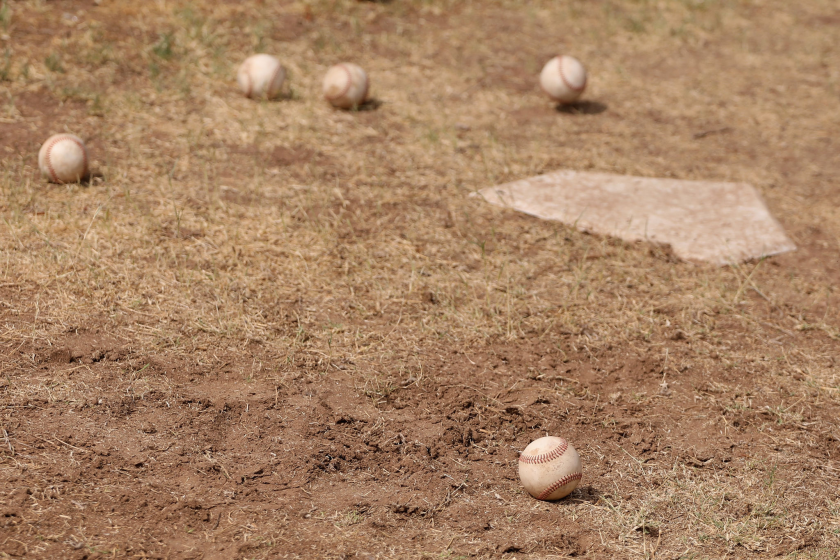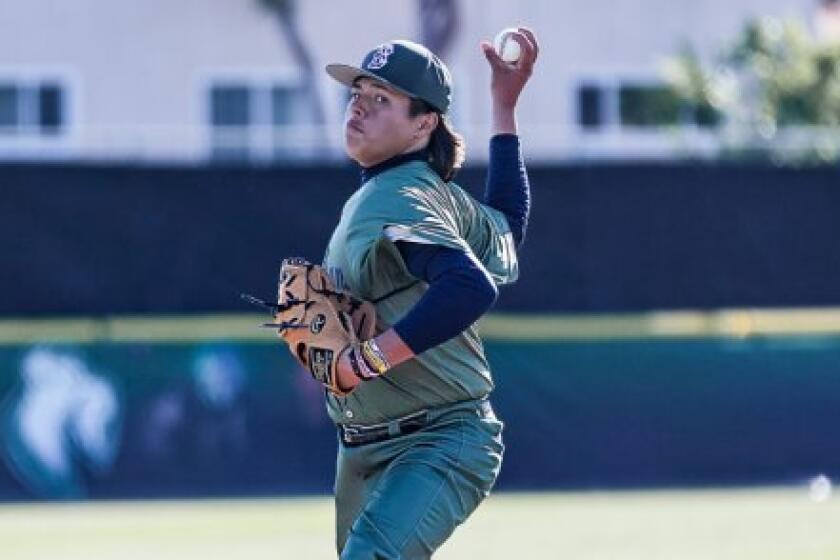Tug of War : High School Teams Often Find Themselves Fighting With Clubs for a Swimmer’s Devotion, but Both Say They Have the Athlete’s Best Interests at Heart
- Share via
It would be Derya Buyukuncu’s last meet for Woodbridge High, so it was understandable that he would want to go out with a bang last year at the Southern Section Division I swimming finals.
Buyukuncu, who was born in Turkey and now attends Michigan, had missed breaking the 50-yard freestyle national high school record by only 10ths of a second in an earlier race. When he broke his national record in the 100-yard backstroke, the fans at Belmont Plaza in Long Beach cheered wildly.
Dan Gaines, who watched from the pool’s deck, said it was one of the most thrilling moments in his coaching career at Woodbridge.
Dave Salo, who watched from the stands, said his heart was with the swimmer he had coached the past three years on the Irvine Novaquatics club.
Salo said he wished he could have been on the deck to congratulate Buyukuncu, but instead kept his distance. He acknowledged the line that separates club swimming from high school swimming.
He also demonstrates the gulf that can exist between club coaches and high school coaches. Salo blames egos for this rift, with each coaching battling to preserve an important role in the development of a young swimmer.
“I think my ego is in pretty good check,” Salo said. “When I’m watching one of our kids swim, I’m looking at how we, as a club, can get better. I look at my role as a facilitator. When a kid is in a meet, it’s his show. It’s time to show the results of the work they’ve done, the effort they’ve put into their sport.”
The majority of swimmers who reach the Southern Section finals do the majority of their training with their clubs--not their high school teams--during the high school swim season.
Many high school coaches have come to accept this arrangement, especially in the case of world-class swimmers whose club training sessions are much more intense. But these same coaches say the high school experience provides something greater than fast splits or gold medals.
“I’ve found that a lot of club swimmers really want to swim with their high schools. They seem to be very motivated and have a lot of fun with the team spirit,” said Sheri Ross, girls’ swimming coach at El Toro. “I don’t pretend to know more than the club coach, but I do think we are great motivators, particularly in high school sports.”
Salo said he understands perfectly the benefits of high school competition; after all, he has coached at Bellflower St. John Bosco High and was the women’s sprint coach at USC. However, he believes there are more benefits to be gained by training with a club.
“I think it’s important to understand that we (club coaches) do it on a full-time basis. I have a lot more exposure to swimming at different levels than a high school coach,” said Salo, who was kicked off his own high school team when he told his coach he was going to train solely with his club.
“Another advantage is that the kids that train in club are exposed to athletes at the same level, so their training experience and environment is better. In high school, you’ll have a broader scope of ability.”
Janet Evans, multiple-medal winner in the 1988 and ’92 Olympics, said her high school experience was “inspirational” to her swimming career.
“I don’t think Tom (Milich, former coach at El Dorado High) got the credit he deserved,” said Evans, who is training at USC in preparation for the Summer Nationals. “He was a great motivator, and many of the things he said to me then, I still carry with me now.”
As Evans recalls, she was busy preparing for the Olympic trials in her junior year. Even though that was her primary focus, she said she was still excited about the Southern Section finals. “It was a huge event for me. It was so exciting, and I still remember all the camaraderie I shared with my teammates and my coach,” she said.
Evans’ teams never won a section championship, but she won seven Division 3-A individual titles--three in the 200-yard individual medley and four in the 500 freestyle.
Although she trained almost exclusively with the Fullerton Aquatic Swimming Team under Coach Bud McAllister, Evans made a point during the season to train at least one day a week with the high school team.
“It was important to me to do that,” Evans said. “And Bud understood that. It wasn’t like when I was working out with Tom he was giving me bad workouts. He was a very good coach. And I think a lot of these high school coaches are good coaches.”
Ken Dory, boys’ coach at Irvine High, is a former local club coach and swimmer. As he remembers it, he “lived and breathed club swimming” when he was in high school.
“Though unintentionally, I learned a lot of disrespect for my high school coach from club swimming,” Dory said. “And we’re talking about (former Foothill coach) Tom DeLong, who was pretty much of a legend around the school. I thought he didn’t know anything and only my club, which was SoCal (in Tustin), could give me the proper workout.”
Dory said he feels foolish about the way he acted.
“Obviously there has to be an understanding between club and high school. There is good coaching at both these levels,” he said. “I completely understand why a club coach would not want one of his athletes participating in a high school meet if they are getting ready for Junior or Senior Nationals.
“For some athletes, I think it’s important that they stay with their club and train. But for others, high school might work best for them.”
Bill Rose, Mission Viejo Nadadores coach, said a number of his club swimmers compete for their high schools. He believes it’s an important part of a young person’s swim career.
“I, for one, am happy when a swimmer of mine chooses to go out for high school swimming,” Rose said. “I think it’s healthy and offers them different social patterns than they get at the club.”
Rose has been with the Nadadores since 1993. Before that, he was women’s coach at Arizona State.
“It boils down to egos,” Rose said. “Any time you’re dealing with sports and high motivation, egos will definitely be there. It’s important for all the coaches to take a step back and say, ‘Wait a minute, it’s not me, but the athlete.’ ”
Salo echoed Rose’s sentiments, saying he’s a firm believer in keeping his distance at high school meets.
“I’ve seen club coaches warm up their kids at CIF meets, which I think is totally inappropriate,” he said. “I think coaches take too much credit for a swimmer’s performances. A great swimmer will always be great. The trick is to get them to accept a greater challenge. And I think any coach can do that--it doesn’t matter if it’s high school or club.”
According to Bill Clark, Southern Section assistant commissioner, a coach not certified with the high school cannot coach a swimmer at a high school meet.
“I know there are some club coaches who don’t like this rule, but that’s the way it is,” Clark said.
Don Cholodenko, Capistrano Valley coach the last 10 years, said for the most part he has faced an uphill battle with the clubs.
“I’ve had some policies that I put into place, but none ever seemed to work,” Cholodenko said. “At first, I had a policy that when a swimmer was through with Junior (Nationals) or Senior (Nationals), that I would like them to train with us. A couple of kids refused and missed their high school careers completely. That was unfortunate.”
Cholodenko said no matter what policy he tried to enforce, he received flak from some of the club coaches.
“I’ve come to realize that it’s not the coaches who are important, but the kids who should come first,” he said. “And I truly believe if it was left up to the kids, they would gladly swim high school. But unfortunately, they are getting so much pressure from their club or parents that they are brainwashed into believing that they can only get a good workout with their club.”
Cholodenko said he’s resigned to the fact that his team will lose some dual meets because of the unavailability of his club swimmers. “It’s not that important,” he said. “I would rather lose some meets than have a kid be put through all this pressure from his or her club.”
Wendy O’Brien, a junior at Irvine High and the county’s top 50- and 100-yard freestyler this season, now trains solely with the Novaquatics. During her freshman and sophomore years, O’Brien trained with Scott Hinman at Irvine High.
“I felt it was important for me to continue to train with the Novas,” said O’Brien, who was swimmer of the meet at the section Division II championships last year. “It’s not that I don’t like the coaches at Irvine. I have a lot of friends there and I see them all the time, but I just think I get a better workout with Dave (Salo).”
Katie Lowes, the county’s top 200 freestyler this season, and Katie Simmons, a top breaststroker, also are the Novaquatics club members, but they train with Ross at El Toro High during the swim season.
“I have a lot of fun with my team and there’s so much excitement with the dual meets, league finals and CIF,” Lowes said. “It doesn’t bother me to train with El Toro. They have some good coaches there and they give us good workouts. Sometimes I miss working out with Dave (Salo). He’s a very good coach, but it’s only two months and I usually get my best times at CIF finals.”
Steve Furniss, a bronze medal-winner at the 1972 Olympics who swam for Foothill High, said he trained year-round with his club team, until the high-school season.
“Tom DeLong was a very good friend of the family,” Furniss said of the former Foothill coach. “All of my brothers, including Bruce, who won two gold medals at the ’76 (Olympic) games, would train only with him when high school season started.”
The Furniss boys’ choice was never questioned by Flip Darr, who was their coach at Huntington Beach Aquatic Club.
“We had some great swimmers on that club, like Gary Hall and Shirley Babashoff,” Furniss said. “Flip knew we were getting a good workout (with DeLong).”
Furniss said high school competition is almost a spiritual event that can stay with an athlete the rest of his or her life.
“I think you have more of a team atmosphere in high school than in club swimming,” he said.
“Those times on the high school team seem to stand out a lot clearer than some of the individual events I thought were more important back then.”
More to Read
Get our high school sports newsletter
Prep Rally is devoted to the SoCal high school sports experience, bringing you scores, stories and a behind-the-scenes look at what makes prep sports so popular.
You may occasionally receive promotional content from the Los Angeles Times.






